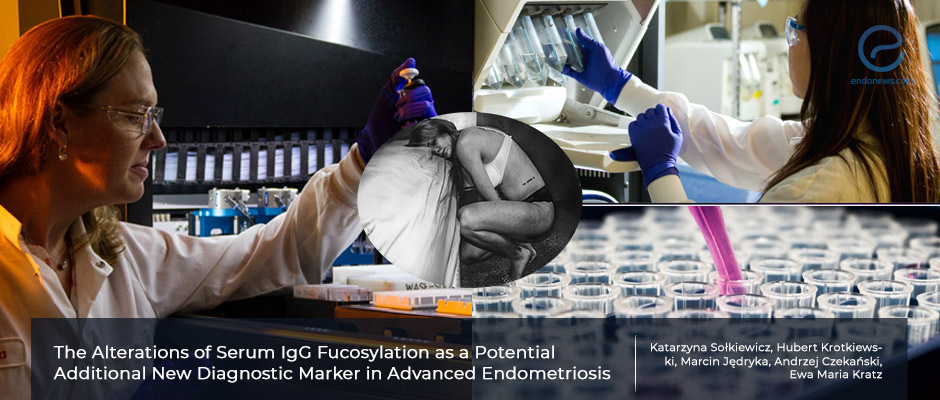A New Non-Invasive Marker for Endometriosis?
Apr 5, 2022
The reactivity of serum IgG with some fucose-specific lectins could be a clinical tool to differentiate women with advanced endometriosis.
Key Points
Highlights:
- There are reactivities between serum IgGs and a panel of fucose-specific lectins, namely AAL, LCA, and LTA.
Importance:
- This reactivity could be a clinical tool to differentiate women with advanced endometriosis from those without the disease.
What's done here:
- Researchers analyzed IgG fucosylation in the serum of 40 women with advanced endometriosis and 36 women without.
Key results:
- s-IgG reactivity with the panel of fucose-specific lectins AAL, LCA, and LTA was observed.
Limitations:
- No patients with early-stage endometriosis were included in the study so it is not possible to tell whether these parameters could also be useful biomarkers in the early stages of the disease.
Lay Summary
The reactivity of serum immunoglobulin G (IgG) with fucose-specific lectins AAL, LCA, and LTA could be a useful diagnostic biomarker for endometriosis, according to a new study published in the Journal of Inflammation Research. It could also be a clinical tool to differentiate women with advanced endometriosis from those without the disease.
“… the analysis of native IgG fucosylation directly in serum, without prior time-consuming, expensive IgG isolation, is sufficient to distinguish advanced stages of endometriosis from a control group of healthy women,” wrote the authors of the study.
It is very difficult to diagnose endometriosis without surgical intervention as there is still a lack of reliable biomarkers for the disease. However, it is now widely established that the disease is associated with inflammatory processes and markers of inflammation are present and can be detected in the blood.
In the present study, a team of researchers from Poland led by Dr. Ewa Maria Kratz from the Department of Laboratory Diagnostics, Division of Laboratory Diagnostics, Faculty of Pharmacy, in Wroclaw Medical University investigated the possible association between serum IgG fucosylation and advanced stages of endometriosis.
They examined IgG fucosylation in the serum of 40 women with advanced endometriosis (stages 3 and 4) and 36 women without the disease. Statistical analyses showed that there were reactivities between serum IgG and a panel of fucose-specific lectins, namely AAL, LCA, and LTA.
Now, more research is needed to assess the clinical utility of this finding in everyday practice to diagnose the disease.
Research Source: https://pubmed.ncbi.nlm.nih.gov/35058701/
serum biomarker endometriosis diagnosis advanced endometriosis

